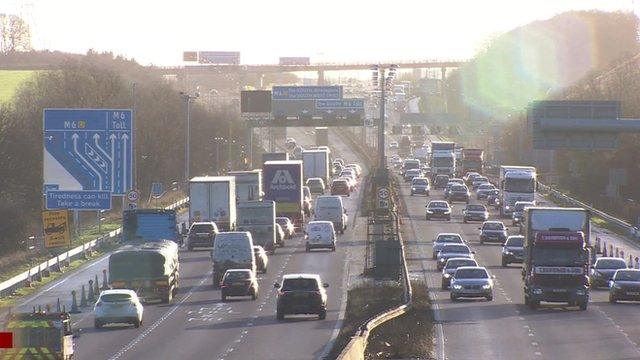Railway signal problems and flooding hit Christmas getaway
- Published
Network Rail is carrying out a series of complex jobs, as Richard Westcott reports
Rail passengers have been hit by signal problems and flooding, as engineering work is due to disrupt train services over the festive period.
Signalling problems at Gillingham disrupted Southeastern, external commuter trains from London, while flooding caused all trains to be cancelled between Folkestone Central and Dover Priory.
Network Rail said 13% of journeys had been delayed across the entire network.
Major engineering work is planned, including at Sheffield and Doncaster.
Track damage
More than a quarter of Southeastern trains have been either delayed or cancelled.
A Network Rail spokesman said: "Subsidence to track ballast on the rail track near Dover Harbour following flooding means we are unable to run trains between Folkestone Central and Dover Priory for the rest of the day.
"Network Rail are on site checking damage to the sea wall by the track.
"We are running bus replacement services between Folkestone Central and Dover Priory to make sure people that live between these two stations are able to get home but we would advise passengers to please check before travelling and leave extra time for their journeys."
Delays and the cancellation of some Southern, external train services will be caused until the end of Thursday because of a "temporary shortage of available train crew".
Engineering works are scheduled to take place on the following lines:
London Liverpool Street, external to Ingatestone/Southend Victoria/Southminster - 27-28 December
To and from Doncaster, external - 27-28 December
To and from Cleethorpes, external until 10 January
Stafford to Crewe, external - 27-28 December
Routes out of London Cannon Street/London Charing Cross, external - 27 December to 3 January
Routes out of London Paddington, including Heathrow Connect/Heathrow Express, external - 27 December to 3 January
Between East Croydon and Redhill, including Gatwick Express, external - 24 December to 4 January
Passengers have been warned to expect journey times to be up to an hour longer on some lines due to replacement bus services.
About 20,000 workers will be carrying out almost 500 improvement projects across the UK. National Rail Enquiries has a full list of the scheduled works, external.
Network Rail chief executive Mark Carne said that passengers had in the past "shown themselves to be incredibly understanding of planned improvement work".
Line closures
Gatwick Express trains will be suspended from 24 December to 4 January while work is undertaken to replace a major railway junction at Purley, south London.
Southern Railway services to Sussex will also be affected.
As part of a longer period of works on Crossrail, Heathrow Express and Heathrow Connect services will not run for four days after Christmas Eve because of a line closure between Paddington and Slough.
Services to the South West and south Wales will also take longer as some trains are diverted from London Paddington to Waterloo or Marylebone stations.
The West Coast Main Line will be closed between Crewe and Stafford from Friday until Tuesday, while there is also a closure on the line from London Liverpool Street to Colchester, Ipswich and Norwich.
In Lincolnshire, improvements are part of a £100m upgrade of infrastructure including replacement of signalling systems and level crossings.

Analysis
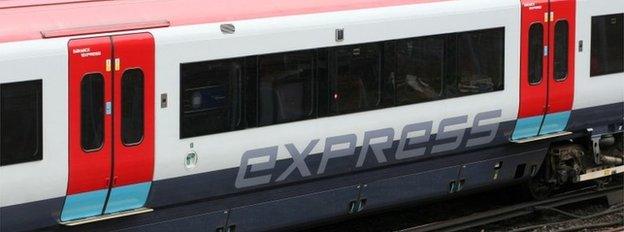
By BBC transport correspondent Richard Westcott
Network Rail always plans its biggest engineering jobs over the holidays because the trains are much quieter.
The company has promised there will not be a repeat of last year's chaos, when 115,000 people were left stranded by a catalogue of errors. The boss was on holiday in Cornwall when it all kicked off last Christmas. He's not going away this year.
It's the fast services to the two biggest airports, Gatwick and Heathrow, that will be hit the hardest by engineering works this year. The last Gatwick Express of the year leaves London at 21:15 GMT on Christmas Eve, although slower services do start again on 27 December.
The best advice is to check online before you set off if you're planning a rail journey over Christmas and the new year.
Follow Richard on Twitter @BBCwestcott, external

The Rail, Maritime and Transport (RMT) union said Britain's "over-stretched" railways had suffered from signal failures, staff shortages and overcrowding in recent weeks.
Last year there was severe disruption when engineering work on the lines from King's Cross and Paddington overran, delaying travellers on the first Saturday after Christmas.
David Sidebottom, from consumer group Travel Focus, said the increase in the amount of engineering works reflected the increase in government investment in railways and passenger fare rises being put to use in improving infrastructure.
He said the relatively quiet Christmas period was being used to complete big jobs that it was not possible to do overnight or at a weekend, describing it as "the least worst option".
Christmas rail disruption
Engineering work on major routes
2.2 million
people are expected to use trains between Christmas and New Year
-
500 separate pieces of rail engineering work between Christmas and 3 January
-
20,000 workers will be on the railways when services are stopped or quieter than usual
-
95% of journeys will be unaffected, Network Rail has said
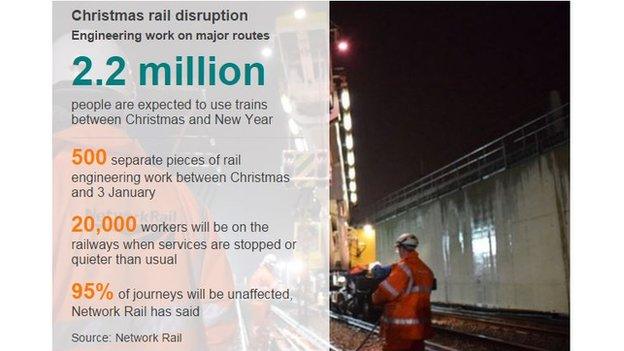
Rail disruption over Christmas
The Independent newspaper's travel correspondent Simon Calder said that while train services were thin, there was for the first time "something resembling a proper inter-city coach network" on Christmas Day.
National Express and Megabus have both put on extra services.
He said it was likely to be the busiest Christmas Day ever at the UK's airports, with an estimated 200,000 people flying in and out - although it would still be the quietest day of the year by some distance.
About 300 people due to fly to the Seychelles have been disappointed after a technical failure grounded their British Airways plane.
The RAC has predicted that Christmas Eve will be the busiest day for traffic on the roads with 4.1 million journeys being made.
Nearly 400 miles of roadworks have been removed to cope with the rush over Christmas.

Have you been affected by train delays? Have you changed your Christmas travel plans as a result? You can share your experience by emailing haveyoursay@bbc.co.uk, external.
Please include a contact number if you are willing to speak to a BBC journalist. You can also contact us in the following ways:
WhatsApp: +44 7525 900971
Send pictures/video to yourpics@bbc.co.uk, external
Tweet: @BBC_HaveYourSay, external
Send an SMS or MMS to +44 7624 800 100
- Published23 December 2015
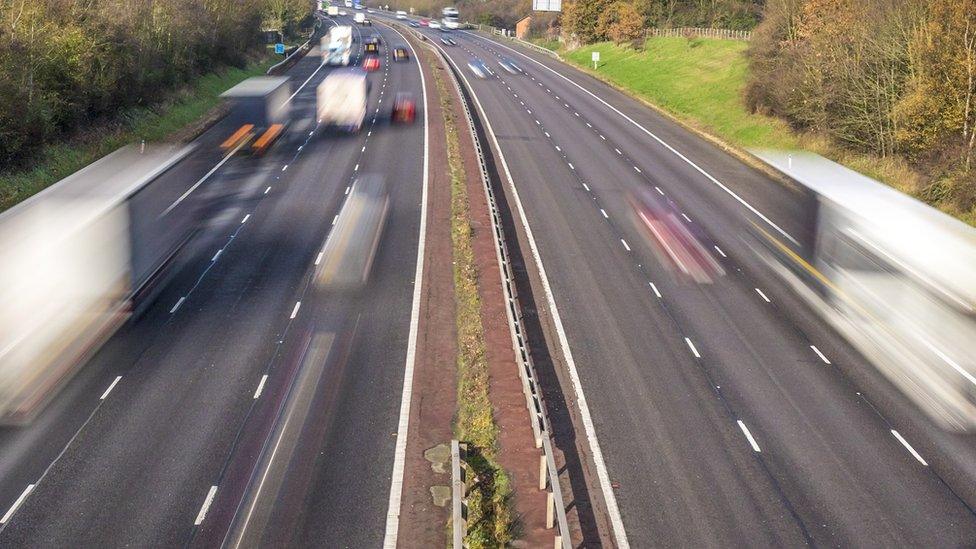
- Published15 December 2015
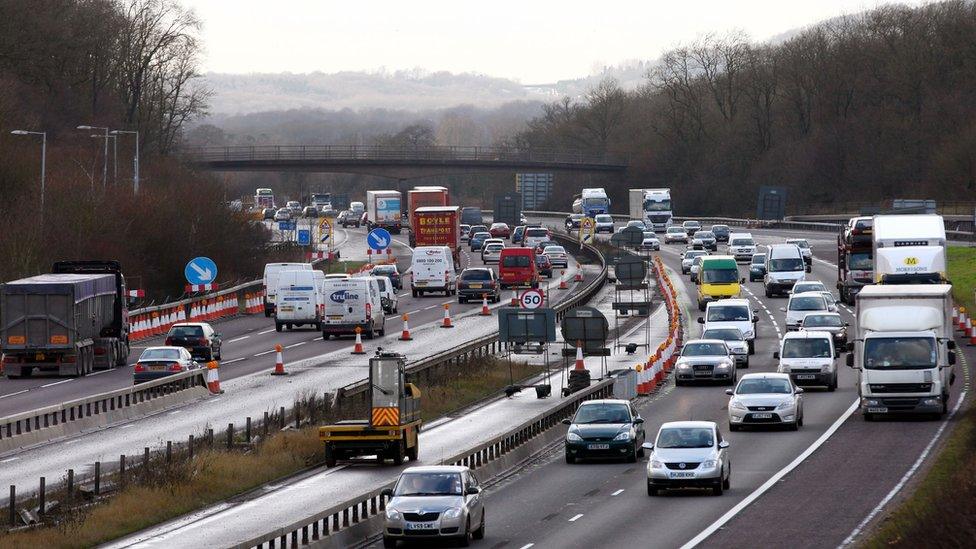
- Published23 December 2015
